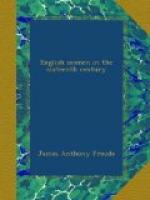A colony of Huguenot refugees had settled on the coast of Florida. The Spaniards heard of it, came from St. Domingo, burnt the town, and hanged every man, woman, and child, leaving an inscription explaining that the poor creatures had been killed, not as Frenchmen, but as heretics. Domenique de Gourges, of Rochelle, heard of this fine exploit of fanaticism, equipped a ship, and sailed across. He caught the Spanish garrison which had been left in occupation and swung them on the same trees—with a second scroll saying that they were dangling there, not as Spaniards, but as murderers.
The genius of adventure tempted men of highest birth into the rovers’ ranks. Sir Thomas Seymour, the Protector’s brother and the King’s uncle, was Lord High Admiral. In his time of office, complaints were made by foreign merchants of ships and property seized at the Thames mouth. No redress could be had; no restitution made; no pirate was even punished, and Seymour’s personal followers were seen suspiciously decorated with Spanish ornaments. It appeared at last that Seymour had himself bought the Scilly Isles, and if he could not have his way at Court, it was said that he meant to set up there as a pirate chief.
The persecution under Mary brought in more respectable recruits than Seymour. The younger generation of the western families had grown with the times. If they were not theologically Protestant, they detested tyranny. They detested the marriage with Philip, which threatened the independence of England. At home they were powerless, but the sons of honourable houses—Strangways, Tremaynes, Staffords, Horseys, Carews, Killegrews, and Cobhams—dashed out upon the water to revenge the Smithfield massacres. They found help where it could least have been looked for. Henry II. of France hated heresy, but he hated Spain worse. Sooner than see England absorbed in the Spanish monarchy, he forgot his bigotry in his politics. He furnished these young mutineers with ships and money and letters of marque. The Huguenots were their natural friends. With Rochelle for an arsenal, they held the mouth of the Channel, and harassed the communications between Cadiz and Antwerp. It was a wild business: enterprise and buccaneering sanctified by religion and hatred of cruelty; but it was a school like no other for seamanship, and a school for the building of vessels which could out-sail all others on the sea; a school, too, for the training up of hardy men, in whose blood ran detestation of the Inquisition and the Inquisition’s master. Every other trade was swallowed up or coloured by privateering; the merchantmen went armed, ready for any work that offered; the Iceland fleet went no more in search of cod; the Channel boatmen forsook nets and lines and took to livelier occupations; Mary was too busy burning heretics to look to the police of the seas; her father’s fine ships rotted in harbour; her father’s coast-forts were deserted or dismantled; she lost Calais; she lost the hearts of her people in forcing them into orthodoxy; she left the seas to the privateers; and no trade flourished, save what the Catholic Powers called piracy.




